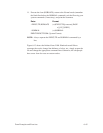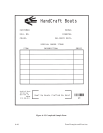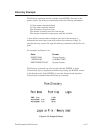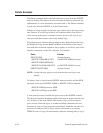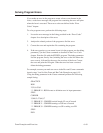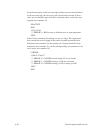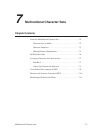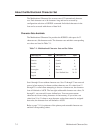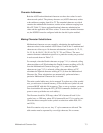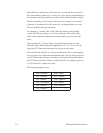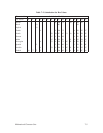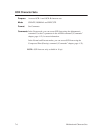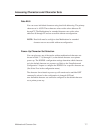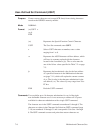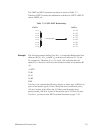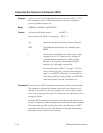Multinational Character Sets 7–3
Character Addresses
Both the ASCII and multinational character sets have hex values for each
character and symbol. The primary character set (ASCII characters) resides
at hex addresses ranging from 00 to 7F. The extended character set, which
contains the multinational characters, resides at hex addresses ranging from
80 to FF. Table 7–2 shows each multinational character substitution hex
value and the applicable ASCII hex values. To access the extended character
set, the IGP/PGL must be configured with the data bit 8 option enabled.
Making Character Substitutions
Multinational character sets are created by substituting the multinational
character values for the standard ASCII values. Each of the 12 multinational
character sets allows up to 16 character substitutions (located at 21, 22, 23,
24, 25, 26, 40, 5B, 5C, 5D, 5E, 60, 7B, 7C, 7D, and 7E hex). The most
common character substitutions specific to a particular country are provided
in each set and shown in Table 7–2.
For example, when the Danish character set (page 7–11) is selected, calling
character address cell 5B substitutes the Danish character residing at C6 (Æ)
from the Multinational Character Set (page 7–11); when the Spanish
character set (page 7–12) is selected, calling character address cell 7C
substitutes the Spanish character residing at F1 (ñ) from the Multinational
Character Set. These substitutions are automatically performed when a
particular Multinational Character Set is selected.
The entire symbol tables may also be mapped. To replace any of the symbol
sets, you must store in internal memory, a file with the new symbol set; and
you must BOOT with this file in memory. Thus, to set up a printer, you must
first download the file using the PTX_SETUP commands; and then cycle
power to start up with the new code table(s).
The file name should be 3XX.map, where XX is between 01 and 10, for
symbol sets; or 5XX.map, where XX is between 00 and 17, for overlay sets.
(Note that these correspond to the symbol set selections within PGL, LP+
and VGL.)
Each file contains only one set. Any ‘C’ style comments are allowed. The
table entries must be separated by a non-digit character, like a comma.



